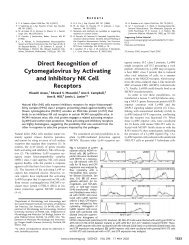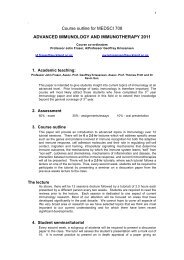Topic 2 lecture note..
Topic 2 lecture note..
Topic 2 lecture note..
Create successful ePaper yourself
Turn your PDF publications into a flip-book with our unique Google optimized e-Paper software.
lymphoid organs is inhibited, and injection of NAD(P) into mice markedly decreases T<br />
cell homing. Note: 41 is not ADP-ribosylated, and B cells don’t express ART2, hence<br />
their homing is not affected.<br />
Ectopeptidases regulate chemokines<br />
CD26 is an ectoenzyme that cleaves N-terminal dipeptides containing either proline or<br />
alanine residues from polypeptides. CD26 is expressed de novo on activated T and B<br />
cells, NK cells, and endothelial cells. Numerous bioactive peptides are cleaved by CD26,<br />
including chemokines. Cleavage of chemokines by CD26 reduces their ability to bind and<br />
activate chemokine receptors, whereas their ability to serve as chemoattracts can be<br />
enhanced (eg CCL5). Rodents that are deficient in CD26 have increased infiltration of<br />
leukocytes into the lung and joints in models of asthma and arthritis, suggesting that<br />
CD26 plays a role in inhibiting inflammation.<br />
Sheddases<br />
CD156b is a sheddase that cleaves L-selectin from the surface of thymocytes. Other<br />
sheddases are also involved. L-selectin is shed from lymphocytes to prevent re-entry of<br />
activated T cells to secondary lymphoid organs.<br />
Ectoenzymes in the control of leukocyte traffic<br />
The nucleotidases CD39 and CD73 regulate the balance of ATP and adenosine, and the<br />
activation of leukocyte integrins and vascular cell adhesion molecules. CD26<br />
proteolytically modifies the activities of chemokines, whereas sheddases cleave leukocyte<br />
cell adhesion molecules such as L-selectin. ADP ribosyltransferases such as ART2<br />
modify and inactivate adhesion molecules.





